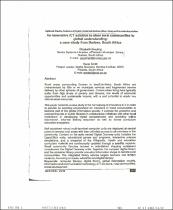 ResearchSpace
ResearchSpace
Innovative ICT solution to steer rural communities to global understanding: a case study from Durban, South Africa
JavaScript is disabled for your browser. Some features of this site may not work without it.
- ResearchSpace
- →
- Research Publications/Outputs
- →
- Conference Publications
- →
- View Item
| dc.contributor.author |
Greyling, E

|
|
| dc.contributor.author |
Smith, R

|
|
| dc.date.accessioned | 2010-01-15T09:41:07Z | |
| dc.date.available | 2010-01-15T09:41:07Z | |
| dc.date.issued | 2008-07 | |
| dc.identifier.citation | Greyling, E and Smith, R. 2008. Innovative ICT solution to steer rural communities to global understanding: a case study from Durban, South Africa . 18th Standing Conference of Eastern, Central and Southern Africa Library and Information Associations (SCECSAL), Lusaka, Zambia, 15-18 July 2008, pp 301-316 | en |
| dc.identifier.issn | 978-9982-9908-0-6 | |
| dc.identifier.uri | http://hdl.handle.net/10204/3892 | |
| dc.description | 18th Standing Conference of Eastern, Central and Southern Africa Library and Information Associations (SCECSAL), Lusaka, Zambia, 15-18 July 2008 | en |
| dc.description.abstract | Rural areas surrounding Durban in kwaZulu-Natal, South Africa are characterized by little or no municipal services and fragmented service delivery by other spheres of government. Communities living here typically suffer from high levels of poverty and disease, low levels of economic opportunities and sustainable income, with a real potential to erode key natural asset resources. This paper presents a case study in the harnessing of innovative ICT in order to provide an enabling environment for members of these communities to become part of the global information society. It outlines the proactive and outreaching role of public libraries in collaborative initiatives wit other local institutions in developing digital competencies and providing online information. Informal lifelong education as well as formal curriculum education is targeted. Self-contained robust multi-terminal computer units are deployed at central points in remote rural areas with free unlimited access to all members of the community. Content on the aptly named Digital Doorway units includes the Open Office suite, educational games and programs, interactive science simulations, and a snapshot of the Wikipedia. Health and education curriculum material are continuously updated through a satellite receiver. Small community libraries housed in refurbished shipping containers complement the Digital Doorway units. Together the compact digital library and the container library provide one-stop information shops to remote rural communities. The integrated library service targets learners and tertiary students, focussing on reader education and digital literacy. | en |
| dc.language.iso | en | en |
| dc.subject | Digital doorway | en |
| dc.subject | Digital library | en |
| dc.subject | Rural communities | en |
| dc.subject | ICT technology | en |
| dc.subject | 18th SCECSAL 2008 | en |
| dc.title | Innovative ICT solution to steer rural communities to global understanding: a case study from Durban, South Africa | en |
| dc.type | Conference Presentation | en |
| dc.identifier.apacitation | Greyling, E., & Smith, R. (2008). Innovative ICT solution to steer rural communities to global understanding: a case study from Durban, South Africa. http://hdl.handle.net/10204/3892 | en_ZA |
| dc.identifier.chicagocitation | Greyling, E, and R Smith. "Innovative ICT solution to steer rural communities to global understanding: a case study from Durban, South Africa." (2008): http://hdl.handle.net/10204/3892 | en_ZA |
| dc.identifier.vancouvercitation | Greyling E, Smith R, Innovative ICT solution to steer rural communities to global understanding: a case study from Durban, South Africa; 2008. http://hdl.handle.net/10204/3892 . | en_ZA |
| dc.identifier.ris | TY - Conference Presentation AU - Greyling, E AU - Smith, R AB - Rural areas surrounding Durban in kwaZulu-Natal, South Africa are characterized by little or no municipal services and fragmented service delivery by other spheres of government. Communities living here typically suffer from high levels of poverty and disease, low levels of economic opportunities and sustainable income, with a real potential to erode key natural asset resources. This paper presents a case study in the harnessing of innovative ICT in order to provide an enabling environment for members of these communities to become part of the global information society. It outlines the proactive and outreaching role of public libraries in collaborative initiatives wit other local institutions in developing digital competencies and providing online information. Informal lifelong education as well as formal curriculum education is targeted. Self-contained robust multi-terminal computer units are deployed at central points in remote rural areas with free unlimited access to all members of the community. Content on the aptly named Digital Doorway units includes the Open Office suite, educational games and programs, interactive science simulations, and a snapshot of the Wikipedia. Health and education curriculum material are continuously updated through a satellite receiver. Small community libraries housed in refurbished shipping containers complement the Digital Doorway units. Together the compact digital library and the container library provide one-stop information shops to remote rural communities. The integrated library service targets learners and tertiary students, focussing on reader education and digital literacy. DA - 2008-07 DB - ResearchSpace DP - CSIR KW - Digital doorway KW - Digital library KW - Rural communities KW - ICT technology KW - 18th SCECSAL 2008 LK - https://researchspace.csir.co.za PY - 2008 SM - 978-9982-9908-0-6 T1 - Innovative ICT solution to steer rural communities to global understanding: a case study from Durban, South Africa TI - Innovative ICT solution to steer rural communities to global understanding: a case study from Durban, South Africa UR - http://hdl.handle.net/10204/3892 ER - | en_ZA |





